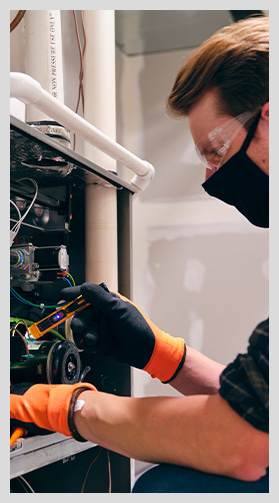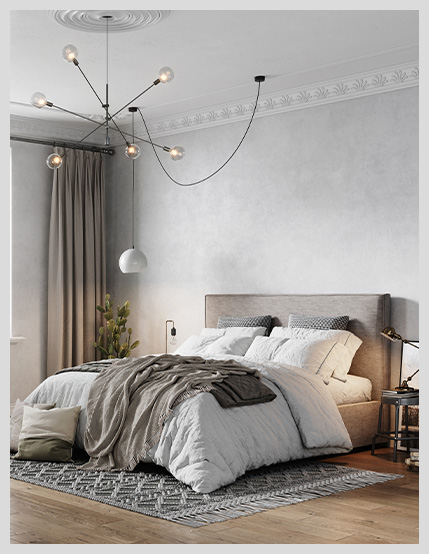Frequently Asked Questions
If you’re visiting our site, and more specifically this page, odds are you are not an HVAC contractor. Therefore, we’re sure you have tons of questions about your heating and air conditioning system, our offers, and the “jargon” we HVAC nerds use. We’ve created this section to inform and empower you, our customer. Whether you’re dealing with an HVAC technician or a used car salesman, you must make sure to arm yourself with as much information on the topic as possible; this way you will be able to sort the scammers and the real experts. As George C. Lichtenburg said, "One’s first step in wisdom is to question everything ...”



Frequently Asked Questions
-
Maintenance Inspections & Tune-Ups
-
Can I perform my own maintenance?
There are many things you can do to help your system perform more efficiently. For tips and tricks visit our Air Conditioning DIY Maintenance page and Heating System DIY Maintenance page. Leave everything else to us. Keep in mind we are professionals and your heating and air conditioning system is one of the most dangerous units in your home. It can contain natural gas, carbon monoxide, high and low voltage, sharp edges, and many fast moving parts. All Air Care technicians go through years of in-class and on the job training to learn how to handle HVAC systems safely and without causing damage to the unit or themselves.
-
How do I schedule an Expert Tune-up?
It couldn't be any easier. Call us, email us, or use our CONTACT page to submit a request.
-
How much does an inspection cost?
The standard cost for our tune-up is $89. We offer a $57 “Comprehensive Tune-up and Inspection” deal for qualified homes in Orange County and the Inland Empire. Check our SEASONAL SPECIALS page for details.
-
How long does a Tune-up take?It depends; if your system is routinely maintained the tune-up and inspection will last anywhere from 60-90 minutes. On the other hand, if your system is not properly maintained it could take much longer. We had one air conditioning tune-up that took over 4 hours!
-
How often should I have my unit serviced?
Bi-annually. Most manufacturers recommend a bi-annual tune-up and inspection, AC during the spring and furnace during the fall. These tune-ups are FREE for members of our Home Service Agreement.
-
-
HVAC
-
Should I Repair or Replace my current HVAC system?
While many of the "costs" associated with your current comfort system may be intangible (reliability problems, uneven temperatures, excessive noise, lack of comfort, etc), some homeowner's may focus more on the hard costs associated with repair vs. replacement. Here are some often overlooked items to consider:
Furnaces lose approximately 1% of their efficiency for every year of operation. So if your 15 year old furnace was 80% efficient when it was installed, it may only be 65% efficient now. Furnaces over 15 - 20 years old were typically only 65% - 75% efficient when they were installed.
Most air conditioners and heat pumps installed before January, 2006 cost up to 20% more to operate than today's LOWEST efficiency models. Purchasing a higher efficiency model can generate even greater energy savings.The cost of repair today may not be your only repair cost in the near future. Often, as comfort systems age, you'll find yourself making multiple repairs in a short period of time to address component failures. When deciding whether to repair or replace, use the cost to FULLY RESTORE your comfort system along with likely future repairs, as your basis for comparison, not just the cost of today's required repair.
-
What is a "variable speed" blower fan?Variable speed "smart fans" are very quiet, and can alter air flow based on the needs of your home, creating more even temperatures and increased comfort. They also allow for constant airflow, providing increased filtration of the air in your home with low overall energy consumption.
-
What is the benefit of a multi-stage furnace?
It warms more gently, only using the higher stages when needed.
-
What is a heat pump? Is it better than an air conditioner?
A heat pump is an electric powered piece of equipment that both heats and cools your home. In the summer, a heat pump is no different than an air conditioner. In the winter a heat pump operates in reverse and heats the indoors. Heat pumps need auxiliary heat (electric heat or gas furnace) to help them when it is very cold (below 42 degrees in the Inland Empire) or when the thermostat is moved more than 2 - 3 degrees at a time. The initial investment for a heat pump is higher than for an air conditioner, and the ductwork must be exactly right for proper operation. One common complaint of a heat pump is that the air coming out of the registers is not hot enough (compared to a gas furnace). With all their drawbacks, heat pumps will reduce the winter heating bills. However, the savings compared to heating with gas is dramatic and you will probably want to stay with a heat pump.
Is it OK to install a different brand of furnace (or air conditioner) to work with my existing air conditioner (or furnace)? Most brands of equipment will work with others as long as the coils and blowers are the proper size. You may, however, experience some loss of efficiency and capacity.
-
What is SEER?This stands for Seasonal Energy Efficiency Ratio. The size of an air conditioner is rated in BTU or Tons, however the efficiency is rated in SEER. This ratio is calculated as cooling output divided by the power input for the average U.S. climate. It's like MPG (miles per gallon) in a car - the higher the MPG (or SEER) the lower the gasoline (electricity) bill.
-
How long does a typical furnace and air conditioner last?On average, a furnace or air conditioner will last 10 - 20 years. Sometimes it pays to replace the old system sooner because of the higher efficiency (lower gas and electric bills) provided by newer equipment. Life expectancies can vary greatly. The major factors influencing life expectancy are proper installation and regular maintenance. Maintenance is a must to maximize efficiency and protect your investment.
-
Why is my HVAC System Freezing-Up?
There are several things that can cause your HVAC system to freeze up, most of them usually need to be corrected by a professional technician. Making sure the filter is clean or replaced and making sure the airflow is not restricted are about the only things you can check or handle yourself.
Low refrigerant: In some cases, freezing up is caused by a leak in the refrigerant lines. Weak solder joints, friction from piping rubbing or vibrating against an object, leaking valves or loose fittings can cause leaks. The age of the system and the nature and location of the leak are the determining factors on whether to have the system repaired or replaced.
Dirty evaporator coil: Over time, the evaporator coil will become dirty. When this happens, the results are similar to those of having a dirty filter. Gradually you will lose airflow, slowly enough that you probably would not realize it until it freezes up or is not cooling adequately. You will need to contact your local Air Care sales and service center to correct the problem.
Defective blower motor or relay: A blower motor not running at the proper speed or not running at all can cause freezing. It can also be intermittent, starting at full speed and slowing down after it heats up. Or a relay could cause it to start one time and not the next. In either case, you will need to contact your local Air Care sales and service center to correct the problem. Should you find that your system was freezing due to a dirty filter, after replacing or cleaning the filter, you can speed up the thawing process by turning the system off and turning on the fan. If you have a heat pump system, you can try turning the system to heating mode until the ice has melted. After the ice has melted, switch the system settings back to normal. If the system refreezes, contact us to correct the problem.
-
Why is it important to have regular maintenance on my heating and air conditioning system?You probably wouldn't buy a brand-new car and expect to never have to put air in the tires, change the oil and check out any unusual noises. Likewise, it is important to have routine maintenance of your home comfort system by an Air Care technician. If not maintained properly and routinely, even the best heating and air conditioning equipment could cause problems and become less 'fuel' efficient.
-
When replacing the outdoor unit, should the indoor unit also be replaced?
The answer is most likely yes, here's why.
Matched System Design: All air conditioner and heat pump outdoor units are specifically designed to work with matched indoor units for optimum efficiency and performance. The result of this matched system is a coordinated, top-performance team that ensures dependability and efficiency. Air conditioner and heat pump outdoor units may "work" with indoor units other than those for which they have been specifically designed; however, the result is a definite compromise in system performance.
Higher Cooling And Heating Efficiency: The cooling and/or heating efficiency ratings that are advertised for an air conditioner or heat pump are based on their performance as matched systems. While changing only the outdoor unit may result in improved efficiency compared to the old system, it will not be as efficient as it was designed to be and your savings will be lower than with a matched system.
Equipment Age: If an air conditioner or heat pump outdoor unit is 10 years old and needs to be replaced, the indoor unit is just as old and has been subjected to the same amount of wear and tear. Replacing both units means you won't have to replace the indoor unit in a short time...you'll have years of service from both units.
New Warranty: A new unit also gives you a new product warranty. Replacing the indoor unit at the same time as the outdoor unit results in peace of mind, knowing the new warranty covers the entire system.
A Bargain: At first glance, replacing only an air conditioner or heat pump outdoor unit may appear to be a bargain. But when you consider the lower cooling and heating efficiencies, decreased reliability and high cost of ownership that results, it's not such a bargain. Replacing an entire system costs more, but you get more efficiency, reliability and comfort.
-
What should I know about changes in refrigerants?To protect our environment, numerous changes have taken place with refrigerants used in air conditioning and heat pump systems. These changes are having, and will continue to have, a significant impact on the air conditioning industry. The Environmental Protection Agency (EPA), through the Clean Air Act, is regulating the production and use of refrigerants. These changes will eventually eliminate air conditioning and heat pump refrigerants containing chlorine because of the concern about depletion of the ozone layer. In response, Air Care Heating and Air Conditioning is offering consumers a choice in environmentally friendlier refrigerants.
-
What's causing my duct work to pop when the furnace starts or stops?A popping sound is a sign of undersized ducts. Have a qualified company analyze your ductwork system for proper design and recommend adjustments. Improper duct work layout can cause a number of ventilation and air quality problems. Leave it up to Air Care, your duct pros also specializing in duct cleaning, sealing and sanitation.
-
How do I know if I have an existing warranty on my furnace, air conditioner or HVAC system?Look at the label on the equipment for a manufacture date. If the equipment is less than five years old, it may have a warranty, but also may not. Warranty terms and conditions vary widely by manufacturer and the installing company. Air Care can determine the warranty status of your heating and cooling system from a basic System Inspection. We also offer a Platinum PLUSTM Protection Plan for residential heating and air conditioning systems, regardless of the equipment age or manufacturer warranty status.
-
Is sound an issue for heating and air conditioning?The louder the better doesn't necessarily hold true for heating and A/C equipment. Heating and cooling equipment should offer maximum comfort with minimum noise. Fortunately, today's technology has enabled manufacturers to produce air conditioners and heat pumps that are not only highly efficient, but also exceptionally quiet. Loud heating and cooling equipment contribute to sound pollution. Although no financial savings are tied to lower sound levels, the sound rating of a cooling system can have a considerable effect on comfort and enjoyment of your home. The sound level of an air conditioner or heat pump depends on a variety of factors. The age of the unit and whether the compressor is insulated or not can contribute to the amount of noise it makes.
-













